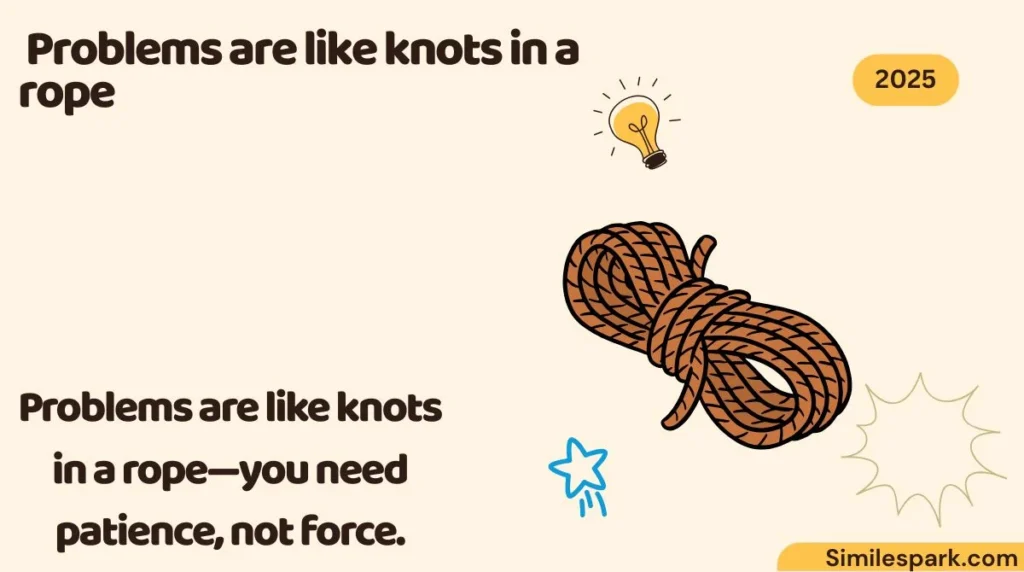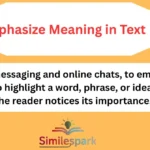Language has a wonderful way of turning ideas into vivid images. One of the most creative tools we use is the simile—a comparison that usually includes the words like or as. Similes help us picture emotions, challenges, and experiences in a fresh and memorable way.
When it comes to difficulties, problems often feel heavy, confusing, or never-ending. That’s why writers, poets, and even everyday speakers love to describe them using similes. They add color to our speech and make abstract struggles easier to understand.
In this article, you’ll discover 31 powerful similes for problems. Each one comes with an explanation, definition, and example sentences so you can use them confidently in your writing or conversations. Let’s dive in!
What Is a Simile?
A simile is a figure of speech that compares one thing to another using the words like or as. It helps readers or listeners imagine an idea more clearly by linking it to something familiar.
31 Similes for Problems
1. Problems are like knots in a rope

- Meaning: Complicated and require patience to untangle.
- Definition: A problem that takes time and care to solve.
- Examples:
- Her financial issues were like knots in a rope, tricky but not impossible.
- Problems are like knots in a rope—you need patience, not force.
2. Problems are like weeds in a garden
- Meaning: If ignored, they grow and spread.
- Definition: Small issues that can multiply if left unchecked.
- Examples:
- Problems are like weeds in a garden—deal with them early.
- His lies grew like weeds, turning small problems into big ones.
3. Problems are like storms at sea
- Meaning: Unpredictable and overwhelming.
- Definition: A chaotic challenge that disrupts peace.
- Examples:
- Problems are like storms at sea—they can shake even the strongest ship.
- Her family dispute felt like being caught in a storm.
4. Problems are like shadows
- Meaning: Always following you unless faced directly.
- Definition: Unresolved issues that linger.
- Examples:
- Problems are like shadows—they don’t go away until light is shed.
- Guilt was his shadow, a problem he couldn’t outrun.
5. Problems are like puzzles
- Meaning: Require patience and logical thinking.
- Definition: A challenge that needs careful arrangement.
- Examples:
- Solving financial debt is like putting together a puzzle.
- Problems are like puzzles—every piece matters.
6. Problems are like mountains
- Meaning: Seem huge but can be climbed step by step.
- Definition: A large difficulty that feels overwhelming.
- Examples:
- Problems are like mountains—daunting, but not impossible.
- She tackled her exams like climbing a mountain.
7. Problems are like quicksand
- Meaning: The more you fight, the deeper you sink.
- Definition: A struggle that worsens with panic.
- Examples:
- Problems are like quicksand—panic makes it worse.
- His debts trapped him like quicksand.
8. Problems are like locked doors
- Meaning: Require the right key or approach.
- Definition: A difficulty that needs the right solution.
- Examples:
- Problems are like locked doors—patience is the key.
- Every locked door hides an answer.
9. Problems are like tangled headphones
- Meaning: Frustrating and time-consuming.
- Definition: Small issues that test patience.
- Examples:
- Problems are like tangled headphones—annoying but solvable.
- Her morning was full of tangled-headphone problems.
10. Problems are like fires
- Meaning: Must be controlled before they spread.
- Definition: A destructive force if ignored.
- Examples:
- Problems are like fires—small sparks grow big.
- His anger lit a fire of problems.
11. Problems are like rain clouds
- Meaning: They hang over you until cleared.
- Definition: A gloomy situation blocking joy.
- Examples:
- Problems are like rain clouds—they pass if you wait.
- She felt a storm cloud following her.
12. Problems are like mazes
- Meaning: Confusing with many wrong turns.
- Definition: A situation requiring careful navigation.
- Examples:
- Problems are like mazes—you must find your way out.
- His legal trouble was a maze of confusion.
13. Problems are like viruses
- Meaning: They spread if not treated.
- Definition: A difficulty that multiplies quickly.
- Examples:
- Problems are like viruses—they infect every area of life.
- One lie spread like a virus of problems.
14. Problems are like icebergs
- Meaning: Much is hidden beneath the surface.
- Definition: A challenge bigger than it appears.
- Examples:
- Problems are like icebergs—most remain unseen.
- Her stress was only the tip of the iceberg.
15. Problems are like chains
- Meaning: They restrict freedom.
- Definition: A limitation that holds you back.
- Examples:
- Problems are like chains—they weigh you down.
- Debt was a chain around his neck.
16. Problems are like hurdles
- Meaning: Obstacles that must be jumped over.
- Definition: A temporary barrier in progress.
- Examples:
- Problems are like hurdles—you can leap them.
- Every hurdle built her strength.
17. Problems are like broken glass
- Meaning: Handle carelessly and you’ll get hurt.
- Definition: Fragile yet dangerous situations.
- Examples:
- Problems are like broken glass—step carefully.
- Their relationship cracked like glass.
18. Problems are like thorns in a rose
- Meaning: Painful but part of life’s beauty.
- Definition: Small struggles that accompany joys.
- Examples:
- Problems are like thorns—you can’t have roses without them.
- She loved him despite the thorns.
19. Problems are like fog
- Meaning: They cloud your vision.
- Definition: Confusion that hides clarity.
- Examples:
- Problems are like fog—patience clears the way.
- He walked through life blinded by fog.
20. Problems are like chains of dominoes
- Meaning: One triggers another.
- Definition: A sequence of connected troubles.
- Examples:
- Problems are like dominoes—one fall starts many.
- A missed deadline triggered a domino effect.
21. Problems are like tight shoes
- Meaning: Constantly irritating until removed.
- Definition: Persistent discomfort.
- Examples:
- Problems are like tight shoes—they hurt until you fix them.
- His worries pinched like bad shoes.
22. Problems are like heavy backpacks
- Meaning: They weigh you down.
- Definition: A burden carried daily.
- Examples:
- Problems are like backpacks—you carry them everywhere.
- She set her burdens down at last.
23. Problems are like leaking boats

- Meaning: Small leaks can sink big ships.
- Definition: Minor issues that become serious.
- Examples:
- Problems are like leaks—ignore them and you’ll drown.
- His careless spending sank his finances.
24. Problems are like slippery ice
- Meaning: Hard to control and risky.
- Definition: A situation full of uncertainty.
- Examples:
- Problems are like ice—you can lose balance fast.
- Their deal was built on thin ice.
25. Problems are like wild animals
- Meaning: Dangerous if provoked.
- Definition: A threat best handled cautiously.
- Examples:
- Problems are like wild animals—tame them early.
- His anger was a wild beast.
26. Problems are like tangled hair
- Meaning: Need patience to straighten.
- Definition: Messy situations requiring care.
- Examples:
- Problems are like tangled hair—pull gently.
- She spent hours fixing life’s knots.
27. Problems are like waves
- Meaning: They come and go in cycles.
- Definition: Repeated struggles in life.
- Examples:
- Problems are like waves—they rise and fall.
- He learned to surf life’s waves.
28. Problems are like ticking clocks
- Meaning: Pressure grows with time.
- Definition: Challenges that demand urgency.
- Examples:
- Problems are like clocks—they keep ticking louder.
- Her deadline loomed like a clock.
29. Problems are like locked cages
- Meaning: Trap you until you find a way out.
- Definition: A confining struggle.
- Examples:
- Problems are like cages—you must find the key.
- His fear kept him locked inside.
30. Problems are like sand in shoes
- Meaning: Irritating until removed.
- Definition: Small issues that cause big discomfort.
- Examples:
- Problems are like sand in shoes—they wear you down.
- She shook out her worries like sand.
31. Problems are like mirrors
- Meaning: They reflect deeper truths.
- Definition: A difficulty that reveals hidden lessons.
- Examples:
- Problems are like mirrors—they show who we are.
- His mistakes became mirrors for growth.
How to Use These Similes in Your Writing
Similes are not just for poetry—they bring life to all forms of writing. Here are creative ways to use them:
- Poems: Add emotional depth by comparing struggles to storms, chains, or waves.
- Stories: Make characters’ challenges more relatable by using vivid comparisons.
- Songs: Turn abstract feelings into concrete images with similes like problems are like shadows.
- Essays: Strengthen arguments with descriptive comparisons that engage readers.
FAQs
What is a simile for problems?
A simile for problems is a creative comparison, like “problems are like knots,” that helps explain difficulties in a relatable way.
Why use similes to describe problems?
Because they make complex struggles easier to imagine, more memorable, and emotionally powerful.
Can similes help in storytelling?
Yes. Similes make characters’ struggles vivid and engaging, keeping readers emotionally connected.
What’s the difference between a simile and a metaphor?
A simile uses words like as or like (“problems are like weeds”), while a metaphor states it directly (“problems are weeds”).
Where can I use these similes in real life?
You can use them in conversations, motivational talks, creative writing, or even in academic essays for descriptive effect.
Conclusion
Problems can feel overwhelming, but similes give us a way to describe and understand them better. From knots to mountains to mirrors, these 31 similes show how language transforms challenges into vivid images. Use them in your writing or speech to make your ideas stronger, clearer, and more relatable.










